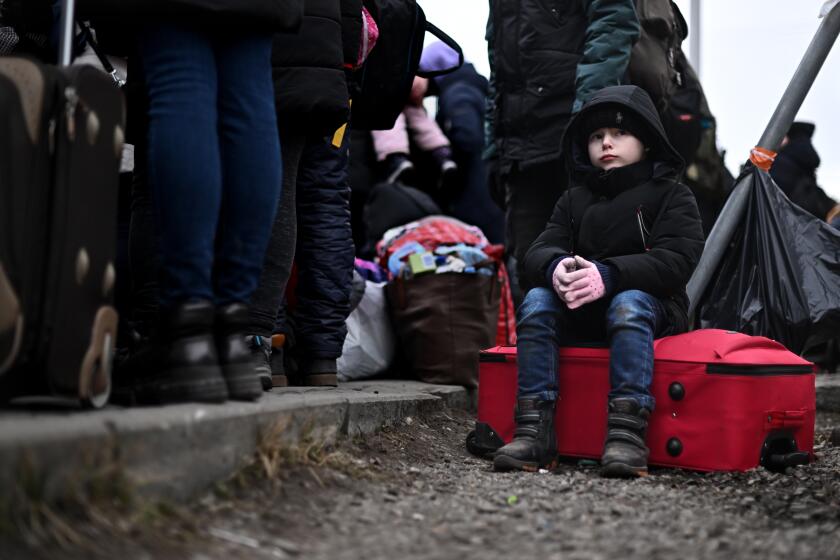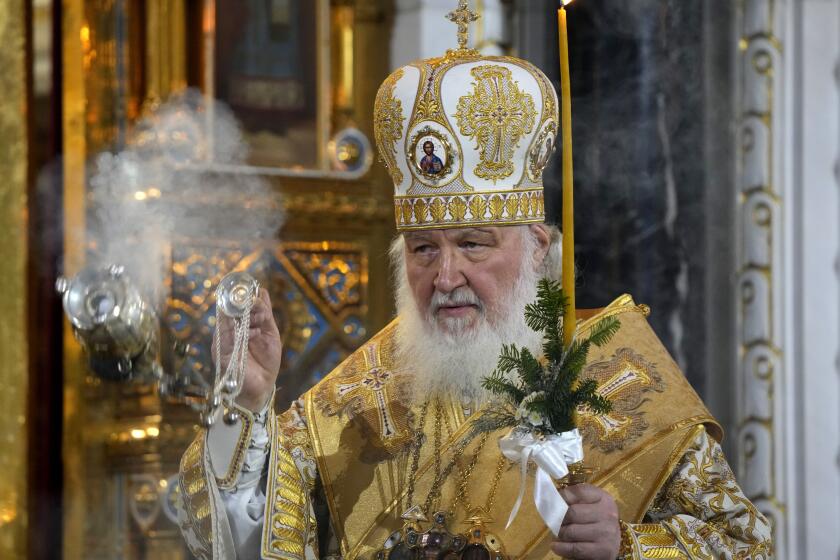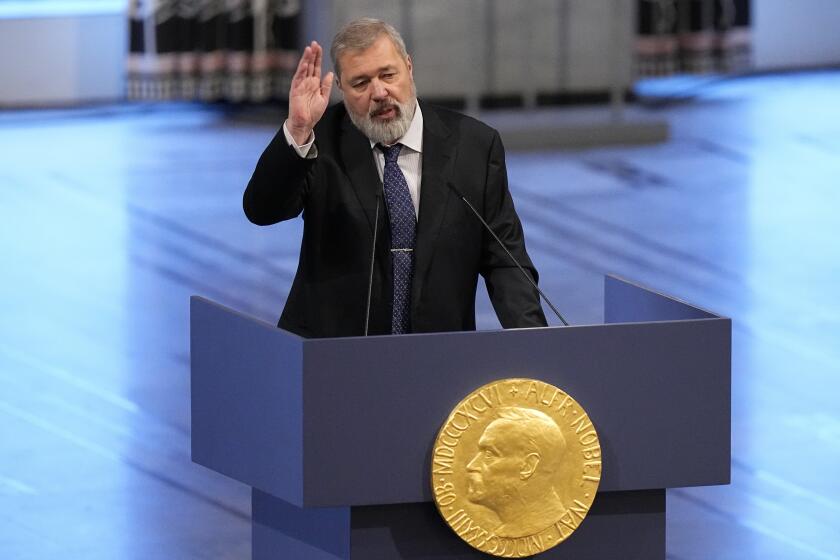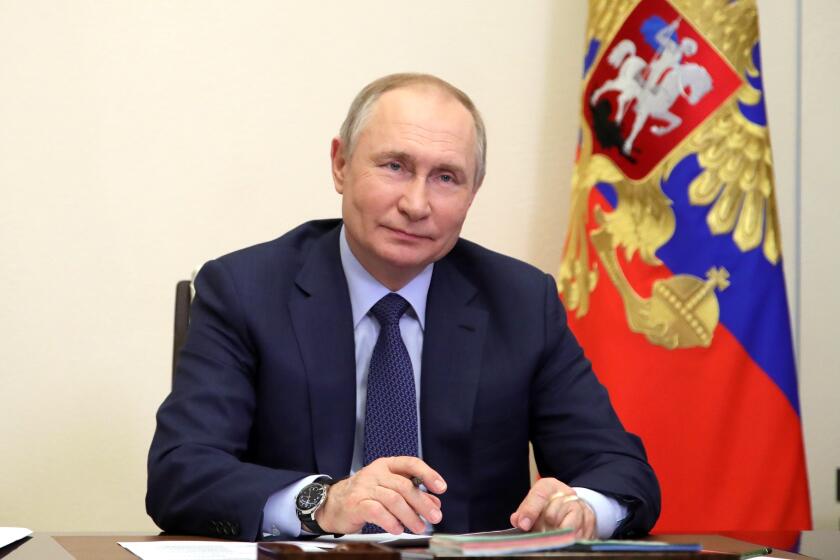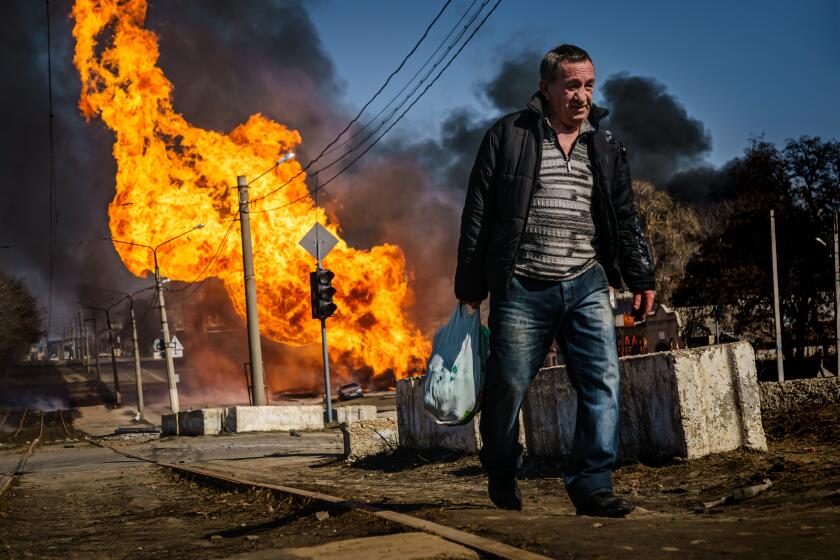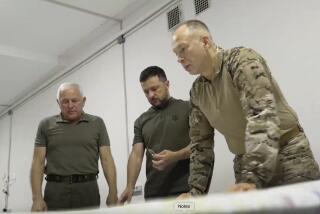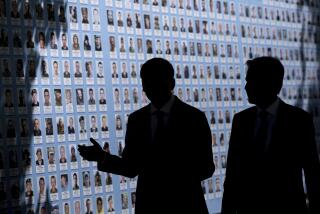As talks with Ukraine resume, offer by Russia to reduce attacks met with skepticism
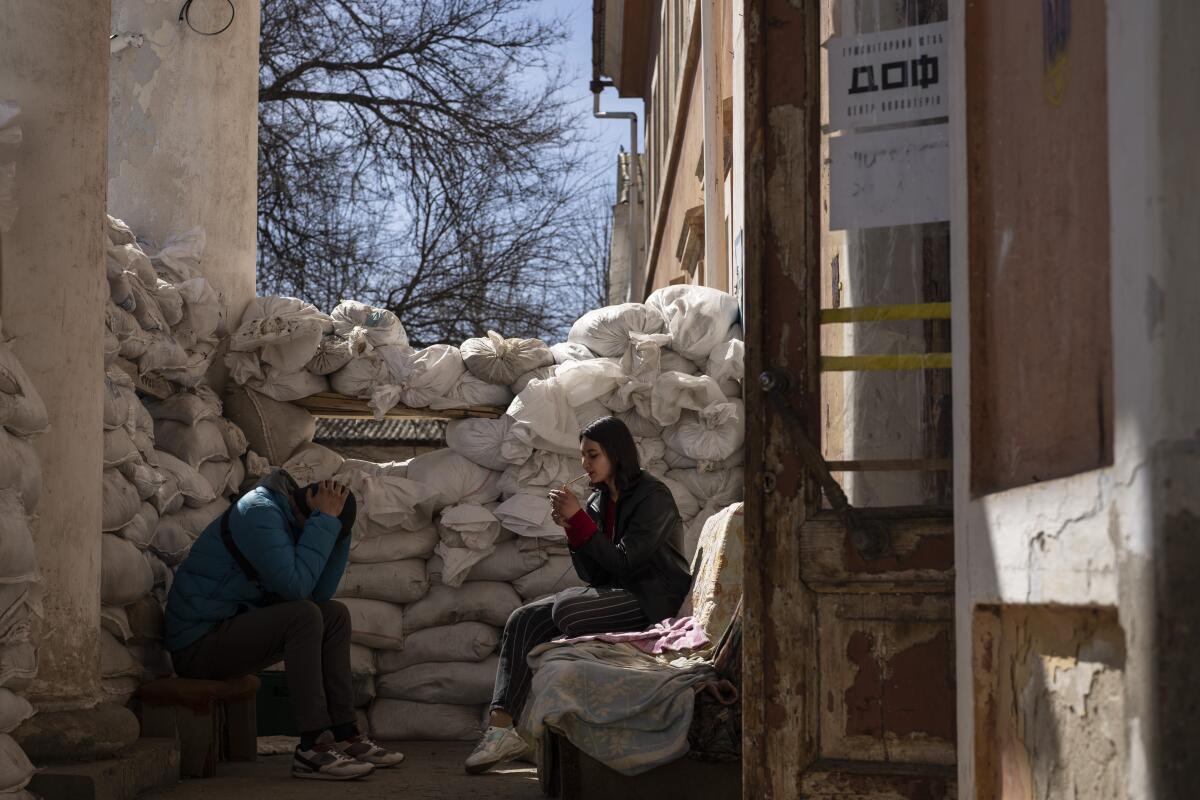
LVIV, Ukraine â Russian negotiators Tuesday offered to pull back attacks on the Ukrainian capital, Kyiv, in a step toward ending the war between the two nations, but U.S. and Western officials remained skeptical of Moscowâs true intentions.
The offer came as Russian and Ukrainian officials held a new round of talks and Ukrainian forces continued to mount fierce resistance in northern parts of the country against a relentless campaign of Russian shelling and missile attacks that has destroyed residential neighborhoods, hospitals and fuel storage depots.
But rather than ending the war, it seemed more likely that Russian President Vladimir Putin was merely shifting focus to the eastern and southern parts of Ukraine, where his forces have moved deeper into the separatist Donbas region and battered the coastal town of Mariupol.
âThere is what Russia says and there is what Russia does,â Secretary of State Antony J. Blinken said. âWeâre focused on the latter, and what Russia is doing is the continued brutalization of Ukraine and its people, and that continues as we speak.â
In Tuesdayâs talks, held in Istanbul, Ukraine also suggested it would accept a position of âneutralityâ â giving up its aspiration to join NATO â as long as other outside entities, such as the European Union, guarantee its security. The negotiations also raised the prospect of a face-to-face meeting between Putin and Ukraine President Volodymyr Zelensky if there were a draft peace agreement.
Yet even as that prospect was emerging, Ukrainian officials ahead of Tuesdayâs meetings warned their delegation not to eat or drink anything because of reports of suspected poisoning of participants in previous talks. Russia has a history of poisoning enemies of the government, so building trust is still a formidable challenge.
Pentagon officials said there were indications that Russian forces may indeed have begun pulling back from Kyiv and the hard-hit city of Chernihiv â but only in very small numbers.
âWeâre not prepared to call this a retreat or even a withdrawal,â Pentagon spokesman John Kirby said. âWe think that what they probably have in mind is a repositioning to prioritize elsewhere.â
But, Kirby added, âThe threat to Kyiv is not over.â
President Biden on Tuesday spoke for an hour with British Prime Minister Boris Johnson, French President Emmanuel Macron, German Chancellor Olaf Scholz and Italian Prime Minister Mario Draghi, to emphasize âtheir determination to continue raising costs on Russia for its brutal attacks in Ukraine,â the White House said.
Russian forces have been bogged down outside the capital for weeks, unable to break through into the heart of the city. In a sign that a reduction in attacks might already have begun, no new missile strikes were reported overnight in Kyiv. But regional officials reported shelling elsewhere Tuesday, including an attack that partially destroyed a government building in the southern port city of Mykolaiv, and an oil depot hit by a missile in Rivne in the northwest.
And it remains unclear whether Moscowâs recent statements about shifting its military focus to eastern Ukraine â which is home to a pro-Russia separatist movement â represent a real reevaluation of the aim of seizing Kyiv and toppling the Ukrainian government, or a temporary move to allow stalled Russian forces to regroup and prepare a heavier onslaught.
With unvaccinated refugees from Ukraine pouring into other countries, health officials hope to avert outbreaks of COVID-19 and other diseases.
After Tuesdayâs talks â the fifth round since Russia invaded its neighbor Feb. 24 â Ukraine suggested that it was open to discussing the status of the Crimean peninsula, which Moscow annexed in 2014.
âIt is offered to clearly record the partiesâ intention to settle the issue exclusively through Ukraine-Russia bilateral negotiations within 15 years. Itâs also offered not to resolve the Crimean issue by military means in any case,â said Mykhailo Podolyak, an advisor to Zelensky.
The statements and a possible Putin-Zelensky meeting were a shift from earlier in the day, when Ukrainian Foreign Minister Dmytro Kuleba said Kyiv was seeking to address âhumanitarian questionsâ at least and a âsustainableâ cease-fire at most. âWe do not trade in people, land and sovereignty,â he said.
Russian Foreign Minister Sergei Lavrov had said Monday that the world needed to âstop panderingâ to Ukraine, accusing Kyiv of only âseeking to generate an image of negotiationâ in its demands for Zelensky-Putin talks.
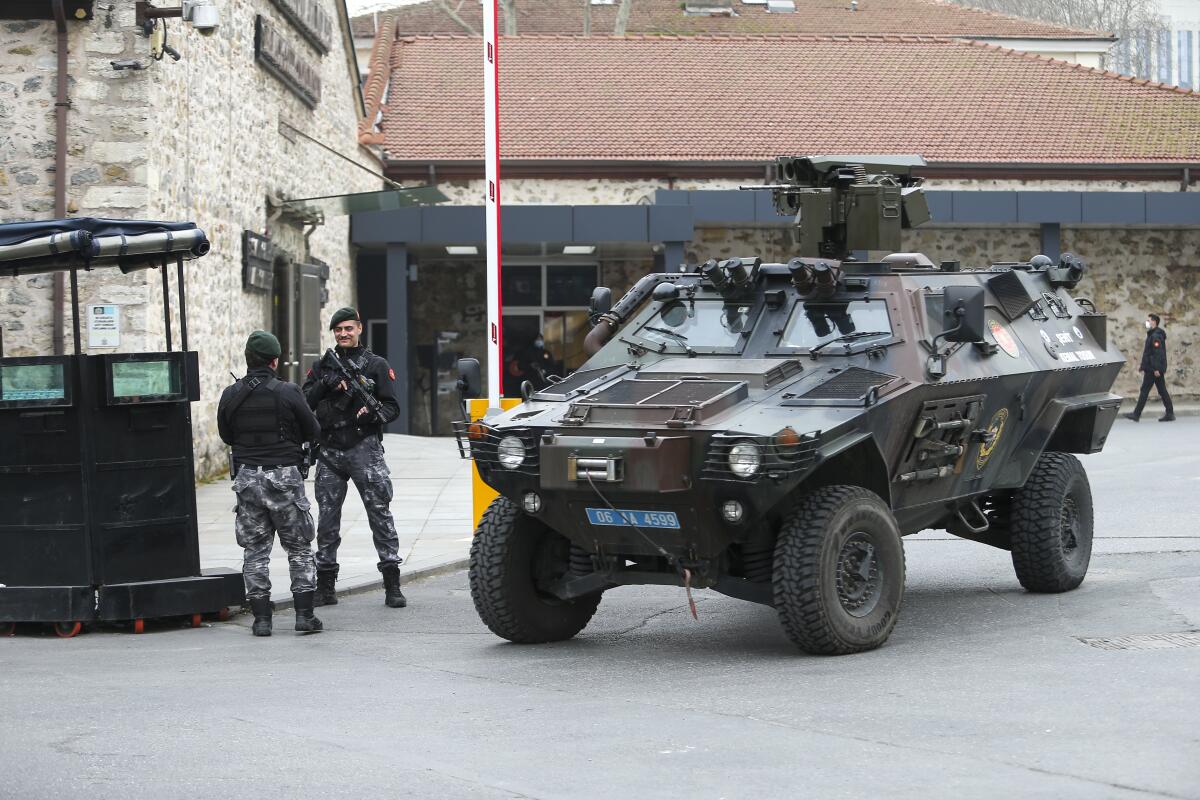
The stalemate at the negotiating table until now appeared to match the situation on the ground in Ukraine, which in recent days has seen a seesaw of gains and losses for both sides after nearly five weeks of armed hostilities.
The British Ministry of Defense said Tuesday that Russians had backed away from âa number of positionsâ around Kyiv but warned that they remained a âsignificant threatâ to the capital.
The analysis matched that of the Ukrainian military and Zelensky, who said overnight that it was âtoo early to talk about securityâ in suburban areas such as Irpin, which Ukraine said it had âliberatedâ from Russian control. The Ukrainian Defense Ministry says Kyiv remains in danger, despite Russiaâs statements on shifting its focus to the Donbas region in eastern Ukraine.
Speaking on national TV on Tuesday, Russian Defense Minister Sergei Shoigu said the Russian military would âconcentrate attention and our main efforts on achieving the primary objective â that is, the liberation of Donbas.â As justification for its invasion, the Kremlin has alleged that Russian speakers in the Donbas are being subjected to ethnic cleansing by the Ukrainian government, an allegation that the U.S. and other nations have rejected as false.
Patriarch Kirill, a close ally of Vladimir Putin, has lent a spiritual justification for the war in Ukraine.
Deputy Defense Minister Alexander Fomin told the Interfax news agency that âin order to increase mutual trust and create necessary conditions for further negotiations ... a decision was made to radically, at times, reduce military activity in the Kyiv and Chernihiv direction.â
Despite the talk of a scaled-back Russian offensive, western Ukraine, which has hitherto been spared a large-scale assault, has seen stepped-up attacks in recent days. Authorities in the city of Lviv reported that two missiles were shot down Monday, two days after a pair of missiles hit targets in the city, a fuel depot and a defense compound. No fatalities were reported.
Russia has been targeting fuel supplies across the country in recent days, including strikes late Sunday on an oil-storage facility in the western city of Lutsk.
In a new report Tuesday, the Ukrainian military said that more than 60 religious buildings, largely belonging to the Ukrainian Orthodox Church, had been destroyed in the war, mostly around Kyiv and eastern areas.
And a national telecom company, Ukrtelecom, said it was knocked offline Monday after a cyberattack. Yurii Shchyhol, an official at the State Special Communications Service, blamed âthe enemy.â He said the company limited phone and internet access for customers in order to maintain coverage for the military.
Russiaâs leading independent newspaper, Novaya Gazeta, has suspended operations under pressure from Vladimir Putinâs government.
Officials in some of the worst-hit areas, including Chernihiv and the southern port city of Mariupol, have pleaded for international aid and an end to daily attacks.
In Chernihiv, where the mayor said a Russian blast destroyed a bridge on a key aid route last week, the shelling has been near-constant, according to local officials. The city is about 80 miles from Kyiv.
In Mariupol, which has lost the majority of its prewar population of 430,000 to evacuations, the mayor said that close to 5,000 people have died amid strikes that have reduced the city to rubble. The number has not been independently verified.
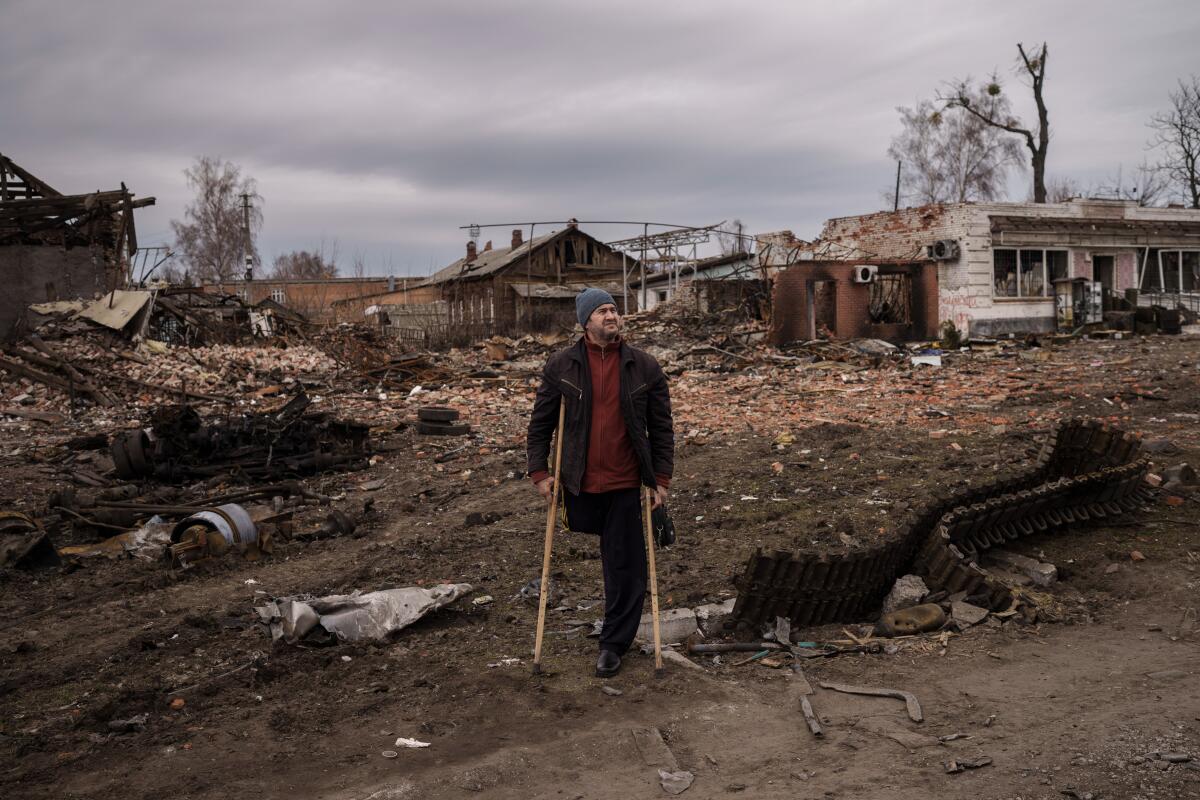
Mariupol is âin the hands of the occupiers today,â Mayor Vadym Boichenko, who spoke from outside the city, said Monday. Boichenko said Russians controlled significant swaths of land in the area.
A Russian takeover of the city would give Putin a corridor to Crimea, which Moscow controls but which has no land connection to Russia.
After negotiations Tuesday, Zelensky advisor Podolyak said that, in addition to being open to discussing Crimea, Ukraine wanted a âsecurity guarantees treaty.â He said it should involve the U.S., Britain, Turkey, France, Germany and other nations as âguarantor statesâ that would be âactively involved in protecting Ukraine from any aggression.â
Western intelligence and military analysts said they suspect Russia may want to split Ukraine and take strategic southern and eastern areas, either through force or negotiations. Zelensky said over the weekend that he could compromise on âthe complex issue of Donbas.â But he has also insisted, seemingly irreconcilably, that âUkraineâs sovereignty and territorial integrity are beyond doubt.â
Putinâs war relies on an ultranationalist ideology pushed by far-right Russian thinkers who see Ukrainian nationhood as a fiction.
The Ukrainian leader said that he was willing to discuss Ukraineâs becoming âneutralâ and dropping aspirations to join the NATO defense alliance as long as Ukrainians were able to vote on the matter.
In an overnight video, Zelensky also criticized international sanctions on Russia as too weak. Sanctions must be âeffective and substantial,â he said, appealing once again for more weapons from allies. Zelensky has sharpened his criticism of Western nations in recent days after his pleas for tanks and warplanes were repeatedly turned down.
âUkrainians should not die just because someone cannot find enough courage to hand over the necessary weapons to Ukraine,â he said. âFear always makes you an accomplice.â
Speaking on Monday to PBS, Kremlin spokesman Dmitry Peskov said Moscow had entered a phase of âtotal warâ that included the Westâs attempt to strangle the Russian economy through heavy sanctions.
What had been a thriving metropolis of nearly 1.5 million people, Kharkiv, remains in Ukrainian hands, but at an enormous cost.
He also said Russia has long feared the expansion of the North Atlantic Treaty Organization to include Ukraine: âFor a couple of decades, we were telling the collective West that we are afraid of your NATOâs moving eastwards. We, too, are afraid of NATO getting closer to our borders with its military infrastructure. Please take care of that. Donât push us into the corner.â
During the interview, which was conducted in English, Peskov clarified earlier remarks he made on CNN suggesting Russia had not taken nuclear attacks off the table. âNo one is thinking about usingâ or âeven about [the] idea of using a nuclear weapon,â he said.
Russiaâs invasion has killed at least 1,150 civilians, according to the United Nations, which acknowledges that the true toll is probably far higher. More than 10 million people have been displaced, including 3.8 million refugees.
McDonnell reported from Lviv, Kaleem from London and Wilkinson from Washington. Times staff writer Marcus Yam in Kyiv contributed to this report.
More to Read
Sign up for Essential California
The most important California stories and recommendations in your inbox every morning.
You may occasionally receive promotional content from the Los Angeles Times.
